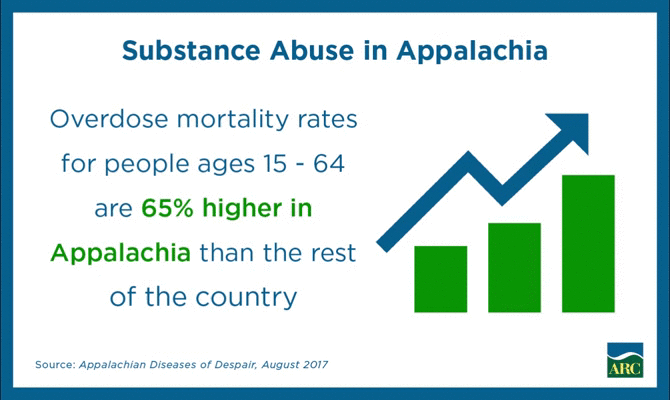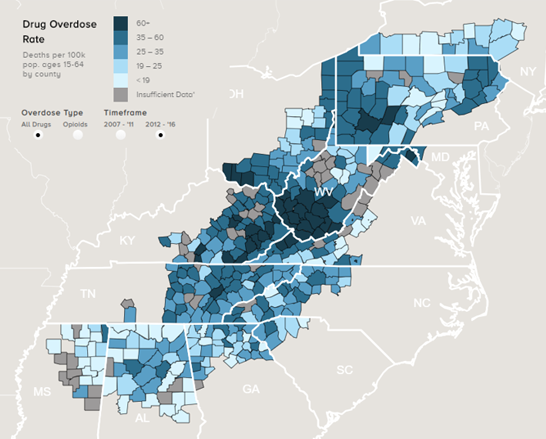Addressing Appalachia's Substance Abuse Crisis

As the nation's substance abuse crisis continues to disproportionately impact Appalachia, ARC is supporting efforts throughout the Region to save lives and strengthen communities by recovery ecosystems. In addition to working with Appalachia's thirteen Governors to identify investment priorities that address this issue, ARC has also:
- Held Recovery-to-Work Listening Sessions in six states between December, 2018–April, 2019. Hosted by the Governors' Offices in each state, the listening sessions focused on the impact that the substance abuse crisis is having on economic and workforce opportunities across the Region and the support services needed to help Appalachians in recovery obtain employment.
- Invested over $9 million through the ARC's POWER initiative to strengthen the response to this epidemic specifically in our Region's coal-impacted communities.
- Formed the ARC Substance Abuse Advisory Council to offer additional guidance and recommendations for how ARC can support the recovery ecosystem. The Council was seated in May 2019, and presented their recommendations outlining proposed steps for supporting a robust recovery system in Appalachia to ARC in August, 2019.
- Released a synopsis report of the Recovery-to-Work listening sessions. The report summarizes the outcome of the community-based discussions and identifies five common themes that ARC should consider when addressing the economic issues stemming from substance abuse. ARC's Substance Abuse Advisory Council will use this information when preparing their final recommendations for the Commission to review in September.
- Developed in partnership with NACo, Opioids in Appalachia: The Role of Counties in Reversing a Regional Epidemic, which offers tools and resources to be useful to Appalachian communities.
- Seeded a community-led, innovative rides-to-recovery pilot project in Huntington, West Virginia to address transportation challenges people in recovery often face in accessing treatment and other support services. Ideas under consideration include training treatment and recovery workers to be mobility advisors, enhancing and expanding available transportation options, subsidizing critical treatment and recovery trips, and engaging rideshare and volunteer driving services.

As ARC continues to identify service gaps and investment opportunities, these listening sessions build on the SUPPORT Act. The SUPPORT Act offers additional guidance to ARC to facilitate sharing of best practices about substance abuse interventions; initiate or expand programs designed to address the economic impact of the crisis; attract and retain relevant health care services, businesses, and workers; and develop relevant infrastructure, including broadband infrastructure that supports the use of telemedicine.
Other useful federal resource
Opioid Misuse in Rural America: a USDA resource tool
|





